For Their Monument, Look Around You
Hope’s professors are sources of information, yes, but more so they are mentors, counselors and role models. By who they are, they help not only make Hope what it is, but Hope’s graduates become who they will be.
A total of nine members of the faculty are retiring this year, two this past December and seven this spring. They have served the college for a combined 249 years. The first among them joined the faculty in 1983, when Ronald Reagan was president, Sally Ride became the first American woman in space, McDonald’s introduced the McNugget, The Return of the Jedi hit theaters, and the Hope College men’s basketball team began an undefeated regular season.
As with Hope’s faculty retirees of the past several years, our stories about each are online, where they will remain, a lasting tribute available around the world. Just like the thousands of current students and alumni whose lives they helped shape.

Andrew Dell’Olio
Professor of Philosophy
29 years
Read more about Andrew Dell’Olio
Dr. Andrew Dell’Olio calls philosophy “a way of life.”
“Philosophy is an attempt to live well, think clearly, and achieve, in the end, inner peace,” he says. “That is what I try to instill in my classes—that this is not just an academic subject. This can actually help you as a person, in your life’s journey.”
One way he helps students wrap their minds around philosophy is by telling dopey “dad jokes.”
“Some students are apprehensive about philosophy, especially in general education classes, so I try to ease them into thinking about big ideas and important questions they might not otherwise think about,” he explains.
This is Dell’Olio’s final semester teaching at Hope College. Since joining the faculty in 1993, he has taught courses in ancient, medieval, and modern philosophy, as well as Ethics, Philosophy of Religion, Existentialism, Postmodernism, and Asian philosophy. He has also taught the interdisciplinary Cultural Heritage sequence, First-Year Seminars and Senior Seminars.
That’s quite a mix, and it represents a shift in his scholarly interests partway through his 29 years at the college. Early on, his main fields were the philosophy of religion and medieval philosophy, especially the virtue ethics of Thomas Aquinas. Over time, his favorite courses to teach shifted to Philosophies of China and Japan, Philosophies of India and Tibet, and World Philosophies.
“I’ve always had a strong interest in the non-Western traditions and had an opportunity at Hope to develop this area of our curriculum. Once I did, it became my main focus,” he says.
That interest has taken Dell’Olio down a range of roads. He founded Hope’s Asian Studies minor in 2005 and was its director until 2020. From 2005 to 2012 he coordinated a program, funded by the Templeton Foundation, that hosted Chinese graduate students in philosophy for a year of study at Hope. He also took students to Japan five times as co-leader of the college’s May Term course at Meiji Gakuin University, and taught t’ai chi in the wellness program for Hope faculty and staff from 2007 to 2020.
Dell’Olio’s other leadership positions included chairing the Department of Philosophy, Academic Affairs Board, Administrative Affairs Board, and Professional Interests Committee. He was faculty moderator from 2003 to 2005.
After majoring in philosophy and psychology at Rutgers College, Dell’Olio earned three graduate degrees at Columbia University: master’s degrees in philosophy and in religion, and a Ph.D. in philosophy of religion. He is the author of Foundation of Moral Selfhood: Aquinas on Divine Goodness and the Connection of the Virtues (2003) and the co-author, with former faculty member Dr. Caroline J. Simon, of Introduction to Ethics: A Reader (2010). In journal articles and chapters in edited volumes, he has explored such topics as the intersection of Christian thought and postmodern philosophy, and whether near-death experiences are a rational basis for belief in life after death. He is working on a book with his retired Hope colleague Dr. Anthony Perovich that traces the shift in English-speaking philosophy a century ago from spiritual concerns to a more secular, scientific focus.
Dell’Olio is not so much retiring as switching tracks. He was recently trained and certified as a philosophical counselor, a new field in which philosophers talk with people about their problems and help them think through issues.
“I think it’s long overdue,” he says, “that philosophers try to apply the wisdom they’ve garnered over the years to people’s personal and practical problems, exploring how philosophy can help people’s lives.”
In addition to establishing counseling relationships, he plans to blog and to continue to teach t’ai chi, perhaps in a new setting.
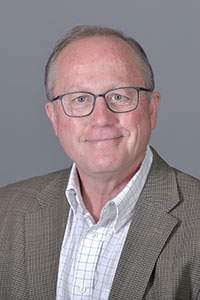
Chuck Green
Professor of Psychology
38.5 years
Teaching and advocacy around issues of diversity and inclusion have been at the core of Dr. Chuck Green’s nearly four decades at Hope College.
The social psychologist was the founding director of Hope’s Phelps Scholars Program, which with a focus on diversity combines academics, residential life, and culture-focused activities and trips. Green directed the program from 1999 through 2013. “It was the highlight of my time at Hope,” he says.
After developing what became his signature course, Race in America, he realized his students were learning important theories and facts, “but the frameworks they used to think about the big picture of race and racism weren’t much different as a result.”
“I realized that had been my experience, too. I started studying racism in graduate school. I learned a lot, and I cared about it. But my work with the Phelps Scholars gave me a new understanding of the effects of racism on real people,” Green reflects. “There were many supporters of the program at Hope, but we faced racist opposition, too. And my students often told me about the racism they experienced. When racism happens to people you know well, people you care about, it becomes much more personal.”
So, he overhauled the course.
“Now we read history and anthropology and politics and religion,” Green says, “because the psychology is powerful when you put it in the context of the broader situation that shapes the psychology. And we read many more first-person accounts so that we see the burdens people carry because of racism. We also spend more time learning how to be antiracist in both our personal and professional lives.”
Green retired in December 2021 from his full-time faculty position, but for a while he’ll continue to teach Race in America and write for its blog, Getting Race Right. In the classroom, he says, his approach is to “ask good questions and turn people loose,” adding comments of his own as the discussion develops. (In a recent note to Green, a former student recalled him “sharing wisdom with kindness and with snark.”) His other courses included Social Psychology, Race in Health and Healthcare, Race in Faith and Christian Life, and First-Year Seminar with the Phelps Scholars.
His other leadership roles at the college included directing the educational assessment program and the Frost Center for Data and Research in the social sciences. He also was involved in the collaborative effort in the late 1990s that reoriented Hope’s general education program.
He delivered Hope’s 1999 Opening Convocation speech, the 2014 “Last Lecture,” and the 2017 Commencement address. In 2019, the graduating class selected him as the year’s Hope Outstanding Professor Educator (the “H.O.P.E. Award”). In his honor as his retirement approached, the college established the annual Green Lecture on Faith, Race and Community at Hope College, an endowed series which will bring distinguished speakers to campus to continue the conversation that Green has so doggedly pursued.
A graduate of Trevecca Nazarene University, Green earned his master’s and doctoral degrees at the University of Florida. He and his wife, Fonda, who directed Hope’s Children’s After School Achievement (CASA) program from 1998 through 2020, have three adult children, all of them Hope alumni.
For all the changes in youth culture since Green came to Hope in 1983, the psychologist notes that “students 40 years ago and students today are really propelled by some enthusiasm and anxiety around two questions: Am I good enough to succeed? And am I worthy to be loved? That has not changed at all, and it’s what makes teaching such a potentially powerful activity — a holy, sacred calling.”
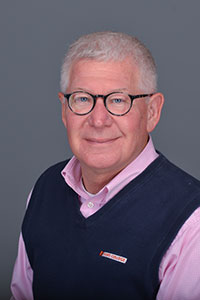
Bill Moreau ’76
Associate Professor of English
38.5 years
Read more about Bill Moreau ’76
Teaching English to high school students and, separately, to college students in the same semester wasn’t a stretch for Professor Bill Moreau ’76. After all, as little as one summer separates the students’ age.
And at Hope College, being a veteran high school English teacher was the perfect foundation for his work with Hope education majors preparing to become secondary school English teachers themselves. He taught the secondary English methods class from 1983 through his retirement in December 2021, and in his final decade at the college he observed the classroom teaching of all 55 of the education majors in that track.
“My biggest enjoyment of teaching high school or at Hope — and my biggest skill set, I think — is relational. What I try most to do is really get to know them,” he says.
For much of his 45-year career, Moreau worked two jobs: part-time at Hope and full-time at nearby Hamilton High School. He took a break from both in the mid-1990s to teach for a year in England through the Fulbright Teacher Exchange program. In 2012, he left Hamilton High after 35-and-a-half years to accept a full-time faculty position at Hope.
In addition to working with education majors, dozens of times he taught English 113, a course designed to cultivate first-year Hope students’ writing skills. (He named his sections of it The Will to Survive and always featured nonfiction.) Four times he was part of the teaching team for the Department of Education’s annual literacy-focused June Term course in Liverpool, England. He chaired the Religious Life Committee and Student Standing and Appeals Committee and served on others related to campus life and co-curricular activities. In his final four years at Hope, Moreau taught a general-education Senior Seminar.
“One reason it’s hard to leave is I started having students who were in 113 who would later take my Senior Seminar. It was great to see how much they’d grown up in four years,” he says. “They just have a much bigger worldview. Many are also excited to step out into the world, but some are just wondering: Are they going to make it? In Senior Seminar, you can talk about those things; they can share their thrills and their concerns about moving on. I saw so many of my students thinking about how they were going to use a servant heart after Hope College. What can I do to give back? What can I do to serve? That, to me, was impressive.”
As a Hope English major, Moreau was named to Phi Beta Kappa and the English honor society Lambda Iota Tau, and received the Sandrene Schutt Award (given yearly to a senior who intends to teach English). In 2016, Hope’s Athletes Coming Together Student–Athlete Advisory Committee honored him as one of 10 Hope MVPs (Most Valuable Professors).
Moreau holds an M.Ed. from Grand Valley State University. He led the Hamilton High School English department for 23 years, started its Advanced Placement English program, and taught AP English Literature and Composition there for 17 years. In what he calls “the coolest thing I did as a high school teacher,” he initiated an exchange program with the British high school at which he taught in the mid-’90s; over 18 years, more than 350 American and British students participated.
In retirement he will continue to serve on the steering committee of Big Read Lakeshore, an annual, month-long program organized by Hope that encourages West Michiganders to read for pleasure and enrichment. His writing has appeared frequently in Michigan publications including the Grand Rapids Press Lakeshore Edition.
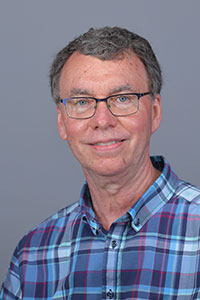
David O’Brien
Associate Librarian – Head of Collections and Access
31 years
Travel through time back to 1991, David O’Brien’s first year at Van Wylen Library, and you’d find him placing transparencies on an overhead projector, teaching students how to use The Readers’ Guide to Periodical Literature to locate scholarly journal articles.
Thirty-one years later, he’s delighted to have helped usher in the digital revolution at Hope College.
“It’s been the best time in history to be a librarian,” he says. This despite his own admission that a librarian’s job is now “a lot more hectic, just because there are so many sources of information. Trying to get students to understand that it’s not all equal, and how to find out whether something’s a good source of information versus something to be viewed with more skepticism — driving that point home is increasingly hard.”
O’Brien will retire in May as Van Wylen’s head of collections and access services. In the latter role he oversees the circulation department, interlibrary loan operations, and the digital media lab. As head of collections he helps establish policies to guide the librarians responsible for specific subjects of the library’s holdings. His category has always been science — he has a master’s degree in science education — and he’s Van Wylen’s liaison to six of the departments in the Natural and Applied Sciences Division.
In consultation with them, he expanded Van Wylen’s science holdings. He also canceled all the print subscriptions to science magazines and journals, replacing them with many times more digital subscriptions.
In 1991, the library had no budget line for electronic publications. Now, that line is the biggest chunk of the budget, and e-books outnumber print books roughly three-to-one. But O’Brien continues to build and maintain the print collection, too. Recently, for instance, after browsing the stacks to find “books that are really beat,” he ordered replacement print copies of books by Jack London and Charles Dickens, retiring from the shelves a complete set of Dickens’ work “from 1900 or so—and it looked like it.”
Teaching is another element of O’Brien’s work at Hope. He’s led more than 800 library sessions for classes, at professors’ request, to brief students on the library’s relevant holdings and how to access them. In the 1990s as internet use broadened he taught summer seminars on how to create and surf websites, and gave presentations to teachers and librarians about how to harness the new resource. O’Brien also taught First-Year Seminars four times on American railroad history, with special attention to discrimination faced by Chinese and Irish immigrant workers.
The raft of committees on which he served (and, four times, chaired) include the Administrative Affairs Board, judicial boards, Campus Life Board and campus infrastructure strategic planning study group. When chairing boards, he was their representative to two committees of the Board of Trustees. In recent years he was part of the library team that brought the current Alma resource management system on board to replace what had been separate electronic systems for critical library workflows such as acquisitions, cataloging, and tracking of usage.
A geography major as a Penn State undergraduate, O’Brien earned his master’s degree in science education at the University of Georgia and his master’s in library and information science from the University of Illinois. He worked in all three institutions’ libraries.
His immediate plans for his retirement including gardening, more time with his backyard G-gauge model railroad, and more time with his wife, library serials associate Pat O’Brien, who is retiring this spring from her job at Hope, too. They met as Van Wylen co-workers in 1992 and married two years later.

Geoffrey Reynolds
Librarian – Mary Riepma Ross Director of the Archives
25.5 years
Read more about Geoffrey Reynolds
Geoff Reynolds is years shy of the typical age of retirement, but colleagues who park near him in the campus lot off 10th Street may have had an inkling that his thoughts were turning there. For 25 years, the plates on his cars have read “ARCHIVE.” And then, in January, he showed up with brand new plates: “L8KANDSEA.”
Reynolds will retire in May from something, and to something.
He’ll step down from his position as Mary Riepma Ross Director of the Joint Archives, a satellite department of Van Wylen Library that is responsible for Hope’s, Western Seminary’s, and to some extent the Reformed Church in America’s archival collections. The Joint Archives also has local history materials on a topic special to him: Holland’s boat-building industry.
The end of that sentence is your clue about what Reynolds is retiring to.
When he came to Hope in 1997 as the collections archivist, there was an expectation that, like many in academia, he’d conduct research and write. “Almost all the history topics had been taken. The only one that hadn’t been touched was the boat industry in Holland,” he recalls.
His research began with old phone books, newspaper clippings, and schmoozing with folks in town. Over time he identified 52 boat-building firms, which he has written about in articles and a book, Boats Made in Holland: A Michigan Tradition (2018).
Along the way, a hands-on hobby was born. Reynolds collects and restores a particular brand of boat, Lake ’n Sea—a firm that started in Florida and eventually moved to Holland for just one year before closing for good. He has 12 vintage boats — many of them Lake ’n Sea fiberglass boats in various stages of dilapidation — parked in Charlevoix, Michigan, his hometown, and upon retiring he’ll move there and set to restoring them. “I love researching, restoring, and writing about each boat when it’s done. All of them have a story to tell,” Reynolds says.
All that’s a sideline, of course. Reynolds’ leadership of the archives includes working with interns and with students doing research there. In 2014 he received a Mentoring Award from the college’s Mellon Foundation Scholars Program for his work with Hope students. He teaches individuals and classes how to navigate the archives and fields research-related questions. He reviews collections offered by donors, cataloging items a researcher would care about and returning or discarding the rest. “Many people want you to be the one who throws things away,” he confides.
Another major task is digitizing materials. This spring Reynolds, intern Mackenzie Rhode ’22, student employees and Joint Archives office manager Lori Trethewey digitized audio tapes from the 1970s; Opus, Hope’s literary magazine; and the papers of a member of the music faculty, Professor Charles Aschbrenner, who formulated a new technique to teach piano. Trethewey also digitized photographs and videotapes. The list could go on. Original materials go into temperature-controlled storage on campus or in Grand Rapids; the digital versions are made available online.
“Having all these things completed, those assets benefit the college. That’s what drives me, Lori, or a student every day,” Reynolds says. “It also gives every one of our student assistants experience in some fashion of what we do every day.” Several of the dozen or so interns he has mentored have gone on to careers as archivists.
Reynolds’ bachelor’s degree from Central Michigan University is in secondary education. He began his career teaching high school social studies and English. Subsequently he earned a master’s degree in library and information science, with an archival administration certificate, at Wayne State University. His other work in the field has focused on Henry Ford, General Motors, the Charlevoix Historical Society, and the Detroit Tigers Baseball Club.
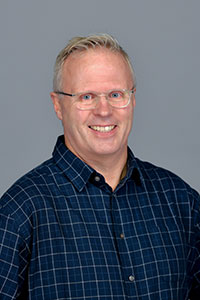
Stein Slette ’87
Assistant Professor of Kinesiology Instruction
20 years
Read more about Stein Slette ’87
All of the Hope faculty who are retiring this year will need to clean out their offices. It seems safe to say that Professor Stein Slette ‘87 is the only one who needs to relocate a big plastic bin of human bones.
The students in his Biomechanics class, or Anatomical Physiology, have come to expect that he’ll come through the door toting a prop. Along with the bones (which will stay on campus for other faculty’s use), the collection in his office includes assorted sports equipment, a homemade pulley system in a wooden frame, a bike wheel, a faux leg joint fashioned from a Gatorade bottle, and eight-and-a-half-feet-long ski jumping skis.
He brings the skis to class when he teaches about fluid dynamics. “Ski jumpers don’t think of them as skis — they think of them as wings,” he says. The winning ski jumper is the one who can fly the best. To teach about friction, Slette brings a suitcase full of climbing gear.
The dynamic visual aids are intended not only to engage students in the classroom — “I want students to develop some curiosity,” he says — but also to generate memories students can draw on later. His teaching has emphasized how rigging pulleys, using one’s arms as levers, and other techniques can extend a physical therapist’s career by minimizing stress on the therapist’s own body when massaging and manipulating the bodies of clients.
“I intentionally try to make it like this,” he explains: “that I have taught them much more than they know they’ve been taught. Some of what I taught them will only surface later. By giving them bits and pieces that I think will stick with them, when they see the situation in front of them and need it, they have it.”
Slette has taught Hope students for a total of 20 years, interrupted twice by periods of work elsewhere. In his first year of teaching, 1988–89, he and his wife, Jane DeYoung ’81 Slette, were the Scott Hall resident directors, too. In his second year, he became the founding coach of the women’s soccer team (which he also coached from 1993 to 1996). His current stretch at Hope began in 2008.
He enjoys keeping in touch with students long after graduation, following their careers and personal lives, and plans to visit one of them this summer. A favorite part of his job has been building relationships in class, in advising sessions, on hikes and in his backyard, where students regularly came to throw axes, grill and make s’mores. That he’s a native of Norway at least partly explains the choice of entertainment.
Slette double majored in social studies and education at Hope. As a graduating senior he received the college’s 1987 William and Mabel Vanderbilt Family Award for scholarship, integrity and the promise of continued outstanding service to others. He earned his master’s degree in exercise science at the University of Utah. In 2014 he received the Hope Outstanding Professor Educator (H.O.P.E.) award from the graduating class.
Sarge, as his students have fondly called him in recent years, is retiring early due to health issues that include chronic migraines from computer use. “If I could just do the teaching, I would do it forever,” he says. He plans to travel extensively with his wife to visit their children, Ingrid ’12 and Andreas ’16, as well as practice what he preaches and get in shape.
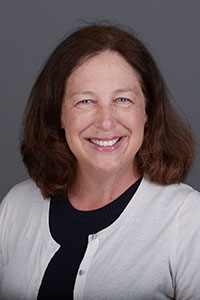
Debra Harvey ’83 Swanson
Professor of Sociology
33 years
Read more about Debra Harvey ’83 Swanson
In a 2016 video on how to give a better lecture, sociologist Dr. Debra Harvey ’83 Swanson laid out her approach in characteristically succinct detail. Smile. Be approachable. Keep it short. Practice delivering the lecture as though it’s a story with characters and a plot.
That’s not to say her students will remember her for her lectures. “Because I learn in discussion, I tend to have a lot of discussion-based classrooms,” she said shortly after launching her spring courses for the last time. But she also lectures, assigns writing and uses case studies. “Everybody learns differently, so we need to try to reach as many students as we can as many ways as we can.”
Swanson retires this May after a cumulative 37 years at Hope: four as an undergraduate sociology major and 33 as a teacher. (Her first five years were as a visiting instructor; she stepped into a tenure track position in 1994.) “Every year,” she says, “students still amaze me — the caring, the respect, the passion they bring, the energy. Every year I’ve been here I’ve had those students. That’s probably the reason I’ve stayed for my whole career.”
Her courses have included Introduction to Sociology, Cultural Anthropology, Race and Ethnic Relations, Sociology of Gender, Social Movements, and her department’s capstone class. Swanson also taught First-Year Seminars on topics from urban design for pedestrians to living lives of activism.
While earning her master’s degree and Ph.D. in sociology at Catholic University of America, her main interests were organizations and social movements. When she realized that female graduate students were taken less seriously because of concerns that they would leave to get married, that refined her research interest to the impact of gender on organizations and movements.
At Hope she began research on the social construction of mothering — the impact on parenting of a woman’s choice of whether to stay home or seek employment outside the home. Over coffee one day, she and her colleague Dr. Dede Johnston (communication) were “lamenting in our identities and joy as mothers. Being academics, we weren’t able to find the book to help us understand that change, so we decided to write about it ourselves.” In a 2003 article in Mass Communication and Society, for instance, they documented contradictory messages in women’s magazines on four important points, including that mothers are both selfish and selfless.
From 2007 to 2012, Swanson directed Hope’s Teaching Enhancement Workshop, since rebranded as the Initium mentoring program for incoming faculty. More recently she focused on teaching and learning, giving presentations on using stories to promote sociological understanding, the impact of inter-group dialogue on students’ experiences in difficult classes, and strategies for class discussions that will promote students’ understanding
Since 2020, Swanson has chaired the Department of Sociology and Social Work. Mentoring the department’s newer faculty, she met bi-weekly with each one, visited their classes, and passed along grant and service opportunities.
She is a recipient of the college’s Ruth and John Reed Faculty Achievement Award, the North Central Sociological Association’s John F. Schnabel Distinguished Contribution to Teaching Award, and the Michigan Campus Compact Award for Outstanding Contributions to Community Service ¬– Learning and Civic Engagement. For her work with the afterschool program Total Trek Quest, she received the state of Michigan’s Premier Mentor Award for Ottawa County. She served on the board of directors of Childhood Development Services (Head Start) for six years, including a year as president of the board, and through Bethany Christian Services was a foster care parent for infants.
In retirement, Swanson will stay involved in the department, developing a teaching module based on research that she will conduct this summer through the Scholar-in-Residence program of the Chicago Semester, and teaching Cultural Anthropology this fall. She also plans to split her time between Holland (where her husband Todd Swanson continues to serve as a member of Hope’s mathematics and statistics faculty) and Florida (where she looks forward to volunteering at a Florida sea turtle rehabilitation center). Other activities on her agenda include learning to be a barista, reading books in the hammock, hiking and taking more cooking classes.
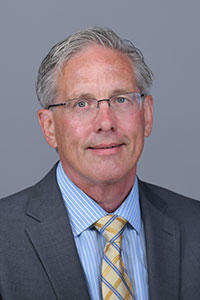
Steve VanderVeen
Professor of Management
18 years
Read more about Steve VanderVeen
It’s always been easy for Dr. Steve VanderVeen to relate to Hope students who aren’t yet sure which career is right for them.
That’s what his own teens and twenties looked like. He took a stab at pre-seminary training, switched to a major in English at Calvin College (now University), and then took a string of jobs from truck driver to stockbroker before discovering that marketing intrigues him, and teaching is a good fit, too.
“My 20s were kind of a mess,” he says. “That period motivated me for what came after, because I was always concerned with helping students discern their gifts and their purpose.”
In his courses on marketing, entrepreneurship and leadership, he has emphasized experiential learning. “I teach the way I want to be managed, which is pretty decentralized,” he says. “I don’t like being told what to do.”
He also played major roles in Hope College’s initiatives focused on entrepreneurship, vocational discernment and leadership development. He directed the Center for Faithful Leadership, now Center for Leadership, from 2007 through 2016 and built its consulting group. He also helped shape the Hope Entrepreneurship Initiative and the leadership minor, which each involved 20 to 30 students in a typical year.
“The entrepreneurship program was unique because the first initiative wasn’t to create businesses for the community; it was to enable students to see if it was something they wanted to do,” he says. “Yet, in the process, the students created some really cool businesses such as Ring Cam, a mini-camera-equipped box for presenting an engagement ring; Fathom, an underwater drone; Spera Foods, which evolved from making food with tiger nuts to also importing them from Ghana; Songs Against Slavery, which took that team to Nashville to raise support for nonprofits fighting sex trafficking; and Morpheus, a scheduling software app.”
Since 2017, VanderVeen has been Ruch Director of the George F. Baker Scholars Program, which develops Hope business students’ leadership potential through personal mentoring, exposure to business leaders, and opportunities for project-based leadership, teamwork, and strategic planning. Leading the Baker Scholars’ yearly spring break trips, VanderVeen, with the help of Hope graduates, staff and friends, introduced Hope students to business leaders in Tokyo, Seattle, Chicago and other cities, finishing up this March with a trip with students to Austin, Texas. He also brought project-based learning experiences to the Department of Economics and Business’s core marketing course; students worked with clients such as Biggby Coffee of Holland, Community Action House, Francis Jaye and Steelcase.
VanderVeen joined the Hope faculty in 2004 after teaching in Calvin’s business department for 15 years. He earned his MBA in marketing at Western Michigan University and his Ph.D. in marketing and consumer behavior at the University of Illinois. In the 2016–2017 academic year he took a leave from Hope to teach at Trinity Christian College in Chicago, and he returned to Chicago in summer 2021 to teach a course on social entrepreneurship to students participating in the multi-college Chicago Semester. His writing has appeared on Entrepreneur.com and in publications including Perspectives, the Journal of Business Ethics, and Christian Higher Education.
In 2021, VanderVeen began writing a weekly local history column for The Holland Sentinel, Holland’s six-days-a-week newspaper. He plans to keep that up after he retires. He also will work with adults with special needs or students who are disadvantaged in some way, to identify or create vocational opportunities for them. In spring 2023 he’ll be a visiting research fellow of Hope’s Van Raalte Institute, writing about entrepreneurs of the past.
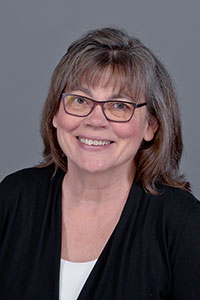
Barbara Vincensi
Associate Professor of Nursing
16 years
Read more about Barbara Vincensi
Over the years, Dr. Barbara Vincensi has heard from a number of former students and learned they are working in public health or starting graduate work in the field. She’s delighted. It’s the corner of the nursing profession that’s especially close to her heart.
“That’s where we need to start focusing our healthcare, not waiting for people to become sick and hospitalized,” she says.
Vincensi, a nurse practitioner, retires in May after teaching Hope College nursing students for 16 years. She has worked with students doing senior research projects and taught in the areas of gerontological and community health nursing, doing a major revision of the latter course 11 years ago.
In the Department of Nursing, she chaired a number of committees involving curriculum and program development, and in 2015 she launched a new program of her own: a weekly, student–faculty nurse-managed wellness center at a low-income older adult housing complex not far from campus. It offers elderly residents health monitoring and screenings, exercise, and social interaction. It also gives Community Health Nursing students an opportunity to learn by doing — and what may be students’ first opportunity to build relationships with people of lower income and limited resources. Students keep reflective journals in this course. “This is an awakening for them on a number of levels,” she says. “It’s easier to relate to the residents in clinics when students have attended the coffee hours building relationships with residents.” The wellness center will continue after Vincensi retires, as part of the community health nursing course.
Building relationships is central to another of her professional specialties, providing spiritual care by nurse practitioners. “The more you discover your own spirituality, the more you are able to provide spiritual care,” she says. “You can’t keep giving energy from yourself to others without refilling yourself.” Her articles on relationship-based care and spiritual care provided by nurse practitioners have been published in the Journal for Nurse Practitioners, Journal of Holistic Nursing, and elsewhere. “Using presence is a lot of it — learning to listen, which at this age students find very hard to do,” she says. “People sometimes need time to process before they respond to you. Helping students be more comfortable with the silences between self and others provides a more holistic approach to patient care.”
Vincensi’s nursing career began in 1975. Her broad experience as a clinical nurse specialist and later as a family nurse practitioner included work in acute care; as a certified wound and ostomy nurse; as a parish nurse in a multicultural parish that included five language groups and migrants; in nursing management; and, while also teaching nursing at the college level, as a family nurse practitioner in a family practice office in Holland. For 10 years starting in 1996, she taught part-time at Grand Valley State University. In 2006 she accepted a full-time faculty position at Hope College. She retired from clinical practice in 2016.
She earned her bachelor’s degree in nursing at Purdue University with a concentration in community health and her master’s at Indiana University, and completed additional training at Grand Valley State University for certification as a family nurse practitioner. She received her Ph.D. in nursing from Loyola University Chicago with a specialty in spirituality and spiritual care in advanced practice nursing.
Nature is important to Vincensi, and in retirement she plans to get her hands dirty a whole lot more. This spring she’s been finishing a master gardener program through Michigan State University. She looks forward to spending more time in her gardens this summer, pursuing other hobbies, and visiting her daughter in the Boston area.
